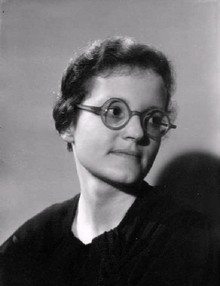Marguerite Vogt
Marguerite Vogt (1913–2007) was a pioneering virologist and cell biologist whose significant contributions to science include her work on poliovirus and the development of methods to grow poliovirus in cultured cells alongside John Franklin Enders, Thomas Huckle Weller, and Frederick Chapman Robbins. This breakthrough was crucial for the development of the polio vaccine and earned Enders, Weller, and Robbins the Nobel Prize in Physiology or Medicine in 1954. Although Vogt's contributions were pivotal, she did not share in the Nobel Prize.
Early Life and Education[edit | edit source]
Marguerite Vogt was born in 1913 in Berlin, Germany, into a family with a strong scientific background. Her father, Oskar Vogt, was a well-known neurologist, and her mother, Cécile Vogt-Mugnier, was a neuroscientist. Growing up in an environment that fostered a love for science, Vogt pursued her education in the field, eventually earning a doctorate in biology from the University of Berlin.
Career[edit | edit source]
After completing her education, Vogt worked at her parents' institute before moving to the United States in the aftermath of World War II. In the US, she joined the California Institute of Technology (Caltech), where she worked with Renato Dulbecco on animal viruses, particularly the poliovirus. Their collaboration led to the development of techniques to grow poliovirus in cultures of kidney cells, which was a significant advancement in virology and vaccine development.
Vogt's research interests were not limited to poliovirus. She also made substantial contributions to the understanding of oncogenes and the SV40 virus, which furthered the field of cancer research. Despite her significant contributions to science, Vogt remained a relatively unsung hero, with much of her work being overshadowed by her male counterparts.
Legacy[edit | edit source]
Marguerite Vogt's legacy is marked by her pioneering research and dedication to science. She is remembered for her meticulous experimental techniques and her role as a mentor to many young scientists. Vogt's work laid the groundwork for future discoveries in virology and oncology, making her one of the most influential yet underrecognized scientists of her time.
Death[edit | edit source]
Marguerite Vogt passed away in 2007, leaving behind a legacy of scientific excellence and a body of work that continues to influence the fields of virology and cell biology.
Search WikiMD
Ad.Tired of being Overweight? Try W8MD's physician weight loss program.
Semaglutide (Ozempic / Wegovy and Tirzepatide (Mounjaro / Zepbound) available.
Advertise on WikiMD
|
WikiMD's Wellness Encyclopedia |
| Let Food Be Thy Medicine Medicine Thy Food - Hippocrates |
Translate this page: - East Asian
中文,
日本,
한국어,
South Asian
हिन्दी,
தமிழ்,
తెలుగు,
Urdu,
ಕನ್ನಡ,
Southeast Asian
Indonesian,
Vietnamese,
Thai,
မြန်မာဘာသာ,
বাংলা
European
español,
Deutsch,
français,
Greek,
português do Brasil,
polski,
română,
русский,
Nederlands,
norsk,
svenska,
suomi,
Italian
Middle Eastern & African
عربى,
Turkish,
Persian,
Hebrew,
Afrikaans,
isiZulu,
Kiswahili,
Other
Bulgarian,
Hungarian,
Czech,
Swedish,
മലയാളം,
मराठी,
ਪੰਜਾਬੀ,
ગુજરાતી,
Portuguese,
Ukrainian
Medical Disclaimer: WikiMD is not a substitute for professional medical advice. The information on WikiMD is provided as an information resource only, may be incorrect, outdated or misleading, and is not to be used or relied on for any diagnostic or treatment purposes. Please consult your health care provider before making any healthcare decisions or for guidance about a specific medical condition. WikiMD expressly disclaims responsibility, and shall have no liability, for any damages, loss, injury, or liability whatsoever suffered as a result of your reliance on the information contained in this site. By visiting this site you agree to the foregoing terms and conditions, which may from time to time be changed or supplemented by WikiMD. If you do not agree to the foregoing terms and conditions, you should not enter or use this site. See full disclaimer.
Credits:Most images are courtesy of Wikimedia commons, and templates, categories Wikipedia, licensed under CC BY SA or similar.
Contributors: Prab R. Tumpati, MD

